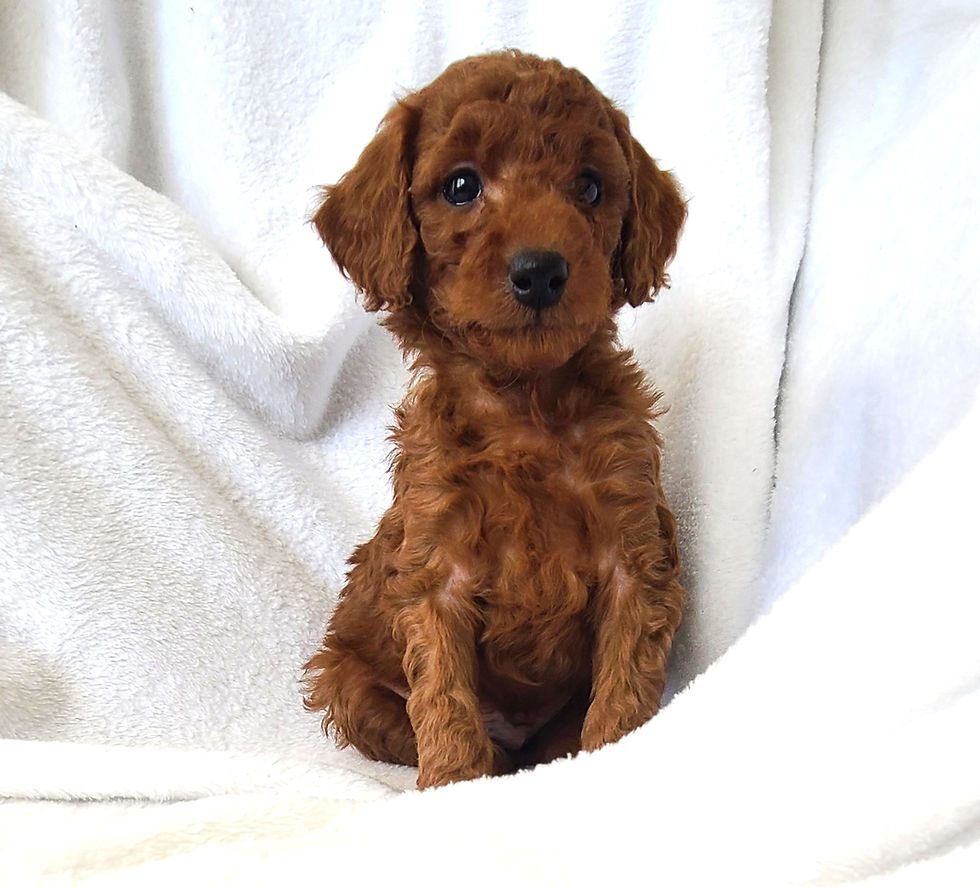SOUPY POOPY
- Julia Turik

- Dec 14, 2021
- 4 min read
Updated: Dec 31, 2024
Today we are going to talk about poop, diarrhea to be exact. Oftentimes, it is the first indication that something is not right with your puppy. It is a common question I get especially when our puppies arrive in their new homes and their poop changes from solid to soupy. Sometimes new owners change the puppy’s diet to quickly, other times the puppy is dealing with untreated stress. Today, I’m going to educate you on the common causes of soupy poopy.
STRESS: Yep, a change in your puppy’s environment, can and often cause their GI system to get off track. The easiest thing to help with the transition from our home to yours is a probiotic. We give your puppy a probiotic from day one and will send some home with your puppy so you can continue this routine. This will help your puppy’s GI tract and when he quakes and quivers it will keep his gut quiet. We use StrellaLab Dog Probiotics Enzymes Prebiotics Fiber Digestive Supplement because they not only have probiotic, but prebiotic and enzymes too! (follow the link to get your own). Your dog’s GI health is an important part of their overall good health so make sure you get some type of probiotic and give to your dog daily. Because during your dog’s lifetime, there will be incidents, places, and situations that will cause stress to the GI tract. Having a wall of protection for your dog’s GI tract will not only benefit him, but you too (no messy soupy poopys to clean up after).
WORMS: A probiotic will protect your puppy’s GI tract if it is free of worms and parasites, if not then you will see soupy poopy. We have been faithful to deworm your puppy on a bi-weekly basis since birth. A very young (under 8 weeks of age) puppy needs to be wormed more often because they are nursing from their mother and living in an environment that is more likely to spread worms. Puppies are curious creatures, and they smell and put everything in their mouths, so when they are all together as a litter, they are more likely to get worms and spread them. When you take your puppy to his vet appointment, they will set you up with a monthly heartworm preventative. This preventative will also have a dewormer included. Giving your puppy a monthly preventative will help keep his gut free of worms and keep him from experiencing worm related diarrhea.
COCCIDIA: Coccidia is a protozoan that causes an infection in the GI tract and soupy poopy is sure to follow! Coccidia eventually gets into all dog's guts. They pick it up from the great outdoors and eating poop (eww). Humidity and rain breeds it and once it is in the environment it is virtually impossible to get out. Older dogs are less effective by it, but in puppies it can be lethal. Coccidia is treated with an antibiotic, typically Albon. In young pups, they are given a 14-day prescription. Coccidia causes not only soupy poopy, but dehydration, abdominal distress, and vomiting. This is no joke, and your pup needs a vet’s care. A slumpy or depressed puppy needs diagnosis and treatment immediately.
GIARDIA: Giardia in dogs is a disease that causes a lot of soupy poopy. It is also a protozoan infection. Beyond diarrhea, Giardia symptoms in pups can include vomiting, excess foul-smelling gas, decreased appetite, decreased energy, and frequent urges to poop. If you suspect Giardia, get your pup to a vet immediately. Often Panacur is prescribed to treat Giardia. It is sometimes hard to tell the difference between Coccidia and Giardia, but a fecal float done by your vet will give you the answer.
TEETHING: When a puppy loses his baby teeth around 12 weeks, a puppy can certainly get a bout of soupy poopy. Teething puppies can develop digestive issues with diarrhea and sometimes vomiting. Especially if you are feeding the recommended hard diet. During this teething period, when and if you see diarrhea, immediately add hot water to his hard kibble and let it soften up. The soupy poopy should clear up within 24 hours and you can contribute his bout of diarrhea with teething. Give the soften kibble for about two months. After that, try to bring the hard kibble back. If no diarrhea, all is well. If you see diarrhea again, he hasn't quite gotten his chewing molars in and needs more time on soft kibble. Just remember that it is vital to your dog's dental hygiene that he eat a hard kibble diet, so bring it back when he can chew again. Puppy teething can last until your puppy reaches 9 to 12 months old. So, hang in there!
Diarrhea in a puppy can be a very scary thing to new puppy owners. I hope that this blog helps to give you some answers and solutions to the common causes of soupy poopy. The takeaway: if your puppy is experiencing soupy poopy, is not acting like himself, or is lethargic, it is recommended that you have him vet checked. You can help your puppy by keeping him on a probiotic and a monthly worm preventative and your puppy ages, his teething can cause a digestive issue. A playful puppy should be placed on a 48-hour watch and given plain (no flavoring) white chicken breast and rice with a probiotic sprinkled on top and if the soupy poopy clears up, all is well. A depressed puppy should see the vet immediately.




Comments